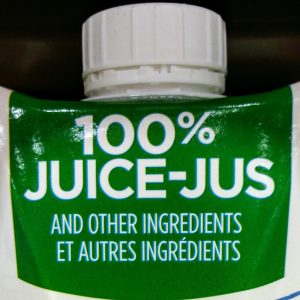Why do many businesses still endorse deceptive marketing? Some more honesty, please
By Stephen Fogarty • July 10, 2018
 How often do you consider the message you receive from businesses clear, honest and authentic?
How often do you consider the message you receive from businesses clear, honest and authentic?
Recently, I was shopping for some juice. The lettering on the container shown in part in the photo here caught my eye, as it was designed to do. Well done marketers!
A quick glance had me assured I was looking at 100% juice, but the finer print states “and other ingredients”. What does this mean? Basically, the claim about the juice itself becomes meaningless. If, for example, there are 80% other ingredients, the product becomes 20% juice. Unhappy with what I concluded was a bad effort at deception, I picked another brand.
This reminds me of the automotive industry. Of course, whenever you purchase a new car, as opposed to a used vehicle, truthfully it is “all new”, not used or “pre-owned”, as the industry prefers to say.
But that is not the meaning the automotive industry is pushing with their claims every year that each model is “all new” and/or “completely redesigned”. In reality, the automotive industry is making claims that are patently false. Imagine the price of a new car if the manufacturers had to start from scratch on R & D, design, parts and manufacturing to produce a vehicle that was all new every year. There would be no way to average out these costs over six years, which, in fact, is what happens with most models. Apparently, the auto industry has concluded that its products cannot be noticed if they are simply “new”. So, the “all new” claim becomes necessary.
It’s no wonder consumers are skeptical about products and services. The juice and auto examples mentioned here illustrate that industry-imposed standards are not effective. Business has only itself to blame for governments having to step in on consumer protection. Many corporations are all to eager to approve of individual advertisements and marketing campaigns that often stretch the truth or amount to outright lies. As Seth Godin writes in “All Marketers are Liars (Tell Stories)”:
“’We’re just serving the market’, ‘We’re satisfying people’s needs’, and ‘Adults have the right to make a decision about this’ are the words of a weasel. Crafting a story that tricks people into making short-term decisions that they regret in the long run is the worst kind of marketing sin. Refusing to take responsibility for it afterward is just cowardice.” (p. 131)
It is not surprising people have become very skeptical of claims made in media spots and on the Internet. But each entrepreneur in business and in the professions can decide to set a positive example, to be forthright in our advertising and claims, to help break the chain of suspicion. Especially as attorneys, it is important not to give false hopes to clients, and to provide honest and impartial advice. How else can we be our clients’ advocates, their professional problem solvers?